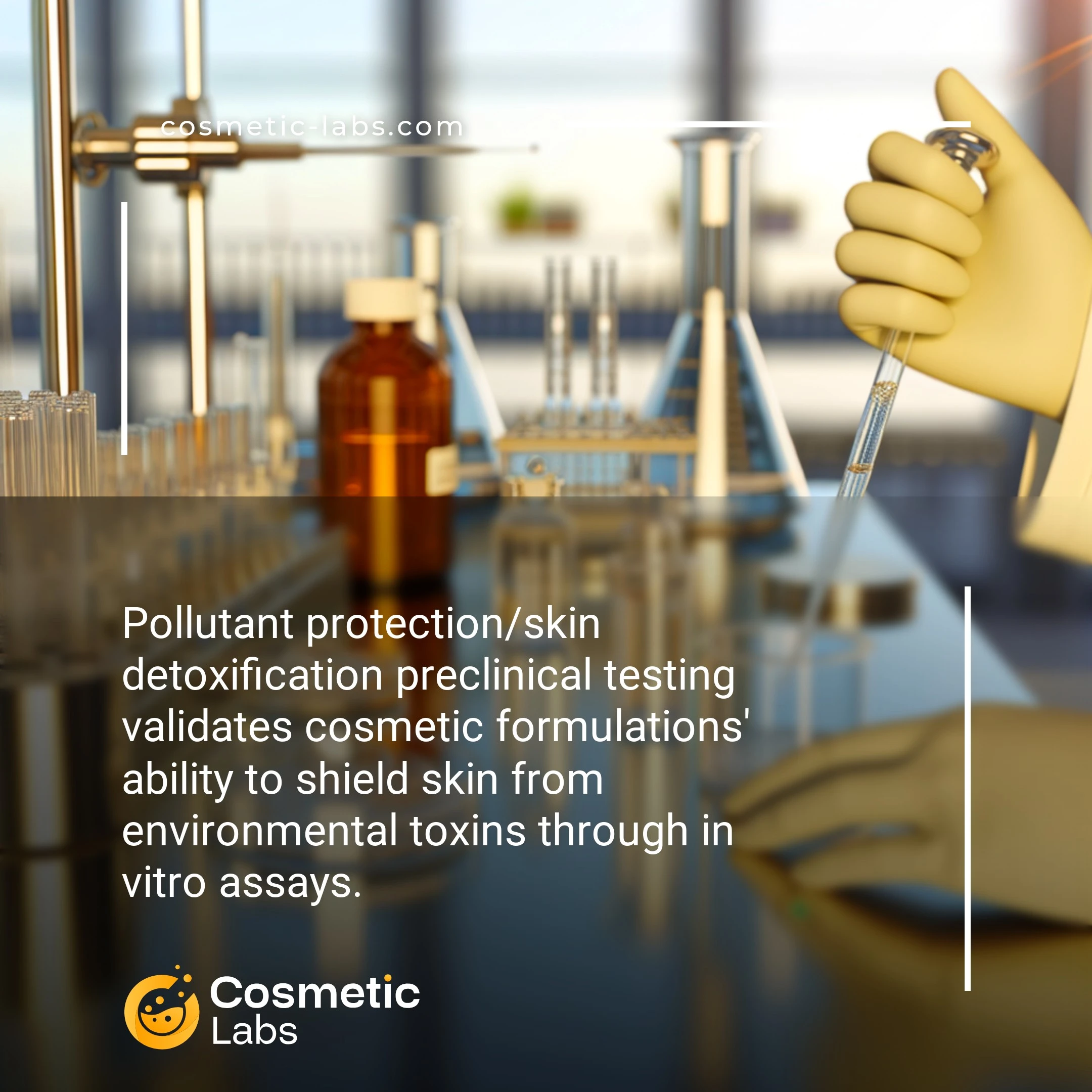Pollutant Protection Testing Services for Cosmetic Brands

What is Pollutant protection/skin detoxification preclinical testing?
Pollutant protection and skin detoxification preclinical testing services evaluate how cosmetic formulations shield skin from environmental contaminants like PM2.5 particles, heavy metals, and urban pollutants. Labs use in vitro cellular models and oxidative stress assays to measure antioxidant capacity, barrier function enhancement, and detoxification enzyme activity. These tests prove your anti-pollution claims with scientific data before market launch.
Why do you need this service?
Cosmetic labs on our platform use anti-pollution testing protocols to validate claims for urban skincare products targeting PM2.5 exposure and blue light damage. Teams measure antioxidant capacity, barrier function recovery, and cellular detoxification markers to support marketing claims like “protects against environmental stressors” or “neutralizes daily pollutants,” delivering quantifiable data for regulatory submissions and consumer confidence.
Who provides Pollutant protection/skin detoxification preclinical testing services?
All cosmetic labs providing Pollutant protection/skin detoxification preclinical testing services
There is no company providing these services at the moment.
Pollutant Protection and Skin Detoxification Preclinical Testing
Modern cosmetic formulations require rigorous testing to validate their protective claims against environmental pollutants and detoxification benefits. Pollutant protection testing measures how effectively your products shield skin from urban contaminants, while detoxification assays evaluate your formula’s ability to remove accumulated toxins and restore skin barrier function.
Environmental Pollutant Defense Testing
Labs use standardized protocols to test your products against real-world pollutants including particulate matter, heavy metals, and oxidative stress inducers. These tests measure barrier protection, antioxidant activity, and cellular defense mechanisms through both in vitro and ex vivo models.
Key testing methods include:
- PM2.5 particle adhesion reduction assays
- Heavy metal chelation capacity testing
- Free radical scavenging activity measurements
- Inflammatory marker response evaluation
Skin Detoxification Efficacy Assessment
Detoxification testing validates your product’s ability to remove accumulated pollutants and support natural skin cleansing processes. Labs measure cellular detox pathways, sebum quality improvements, and pore-clearing effectiveness using specialized biomarkers and imaging techniques.
Testing protocols evaluate:
- Glutathione pathway activation levels
- Sebaceous gland function normalization
- Microbiome balance restoration
- Skin surface contamination removal rates
Partner with verified labs on our platform to validate your anti-pollution claims and build consumer trust through documented efficacy data.
11 subcategories of Pollutant protection/skin detoxification preclinical testing services
There are no results matching your search
Practical Applications of Pollutant Protection and Skin Detoxification Preclinical Testing
Cosmetic labs use pollutant protection and skin detoxification preclinical testing services to validate ingredient efficacy against environmental stressors before product launch.
Anti-Pollution Serum Development
Labs perform particulate matter adhesion assays to test how well formulations prevent PM2.5 particles from binding to skin cells. Testing protocols measure protective barrier formation using in vitro skin models exposed to diesel exhaust particles and urban dust samples.
Cell viability assays quantify antioxidant capacity against oxidative stress markers. Labs track glutathione levels and measure inflammatory cytokine reduction over 24-48 hour exposure periods. Results show percentage improvements in cellular defense mechanisms.
| Test Method | Pollutant Type | Measurement | Timeline |
|---|---|---|---|
| Particulate Adhesion | PM2.5, Urban Dust | Particle Binding % | 2-4 hours |
| Antioxidant Activity | Ozone, Free Radicals | ROS Reduction % | 24-48 hours |
| Barrier Function | Heavy Metals | Permeability Change | 6-12 hours |
Detoxifying Cleanser Validation
Testing services evaluate how effectively cleansing formulations remove accumulated pollutants from skin surfaces. Labs use fluorescent-tagged contaminants to measure removal efficiency and track residual particle counts after washing.
Skin barrier integrity tests assess whether detoxification ingredients maintain natural lipid balance while removing environmental toxins. Transepidermal water loss measurements confirm cleansers don’t compromise skin hydration during the detox process.
Ready to validate your anti-pollution or detoxifying formulations? Connect with specialized cosmetic labs on our platform for comprehensive preclinical testing services.

